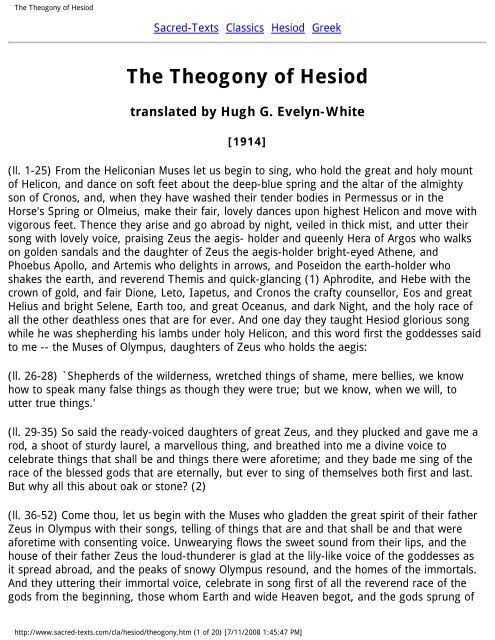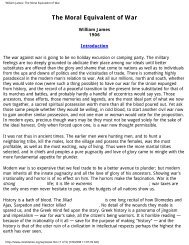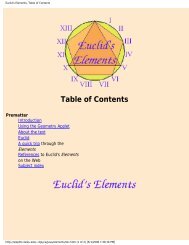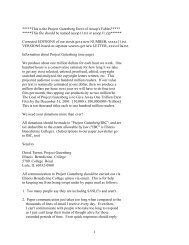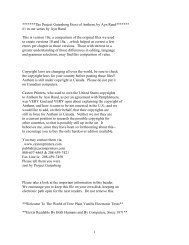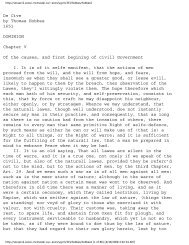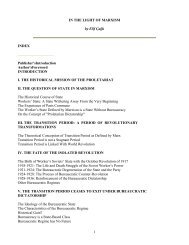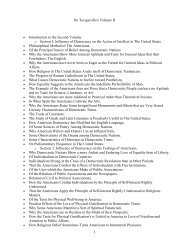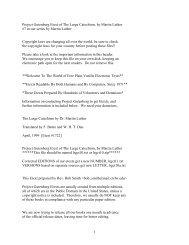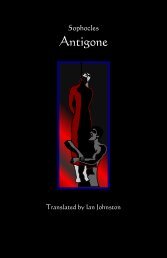Theogony Hesiod.pdf - Xet.es
Theogony Hesiod.pdf - Xet.es
Theogony Hesiod.pdf - Xet.es
- No tags were found...
You also want an ePaper? Increase the reach of your titles
YUMPU automatically turns print PDFs into web optimized ePapers that Google loves.
The <strong>Theogony</strong> of <strong>H<strong>es</strong>iod</strong>Sacred-Texts Classics <strong>H<strong>es</strong>iod</strong> GreekThe <strong>Theogony</strong> of <strong>H<strong>es</strong>iod</strong>translated by Hugh G. Evelyn-White[1914](ll. 1-25) From the Heliconian Mus<strong>es</strong> let us begin to sing, who hold the great and holy mountof Helicon, and dance on soft feet about the deep-blue spring and the altar of the almightyson of Cronos, and, when they have washed their tender bodi<strong>es</strong> in Perm<strong>es</strong>sus or in theHorse's Spring or Olmeius, make their fair, lovely danc<strong>es</strong> upon high<strong>es</strong>t Helicon and move withvigorous feet. Thence they arise and go abroad by night, veiled in thick mist, and utter theirsong with lovely voice, praising Zeus the aegis- holder and queenly Hera of Argos who walkson golden sandals and the daughter of Zeus the aegis-holder bright-eyed Athene, andPhoebus Apollo, and Artemis who delights in arrows, and Poseidon the earth-holder whoshak<strong>es</strong> the earth, and reverend Themis and quick-glancing (1) Aphrodite, and Hebe with thecrown of gold, and fair Dione, Leto, Iapetus, and Cronos the crafty counsellor, Eos and greatHelius and bright Selene, Earth too, and great Oceanus, and dark Night, and the holy race ofall the other deathl<strong>es</strong>s on<strong>es</strong> that are for ever. And one day they taught <strong>H<strong>es</strong>iod</strong> glorious songwhile he was shepherding his lambs under holy Helicon, and this word first the godd<strong>es</strong>s<strong>es</strong> saidto me -- the Mus<strong>es</strong> of Olympus, daughters of Zeus who holds the aegis:(ll. 26-28) `Shepherds of the wildern<strong>es</strong>s, wretched things of shame, mere belli<strong>es</strong>, we knowhow to speak many false things as though they were true; but we know, when we will, toutter true things.'(ll. 29-35) So said the ready-voiced daughters of great Zeus, and they plucked and gave me arod, a shoot of sturdy laurel, a marvellous thing, and breathed into me a divine voice tocelebrate things that shall be and things there were aforetime; and they bade me sing of therace of the bl<strong>es</strong>sed gods that are eternally, but ever to sing of themselv<strong>es</strong> both first and last.But why all this about oak or stone? (2)(ll. 36-52) Come thou, let us begin with the Mus<strong>es</strong> who gladden the great spirit of their fatherZeus in Olympus with their songs, telling of things that are and that shall be and that wereaforetime with consenting voice. Unwearying flows the sweet sound from their lips, and thehouse of their father Zeus the loud-thunderer is glad at the lily-like voice of the godd<strong>es</strong>s<strong>es</strong> asit spread abroad, and the peaks of snowy Olympus r<strong>es</strong>ound, and the hom<strong>es</strong> of the immortals.And they uttering their immortal voice, celebrate in song first of all the reverend race of thegods from the beginning, those whom Earth and wide Heaven begot, and the gods sprung ofhttp://www.sacred-texts.com/cla/h<strong>es</strong>iod/theogony.htm (1 of 20) [7/11/2008 1:45:47 PM]
The <strong>Theogony</strong> of <strong>H<strong>es</strong>iod</strong>th<strong>es</strong>e, givers of good things. Then, next, the godd<strong>es</strong>s<strong>es</strong> sing of Zeus, the father of gods andmen, as they begin and end their strain, how much he is the most excellent among the godsand supreme in power. And again, they chant the race of men and strong giants, and gladdenthe heart of Zeus within Olympus, -- the Olympian Mus<strong>es</strong>, daughters of Zeus the aegis-holder.(ll. 53-74) Them in Pieria did Mnemosyne (Memory), who reigns over the hills of Eleuther,bear of union with the father, the son of Cronos, a forgetting of ills and a r<strong>es</strong>t from sorrow.For nine nights did wise Zeus lie with her, entering her holy bed remote from the immortals.And when a year was passed and the seasons came round as the months waned, and manydays were accomplished, she bare nine daughters, all of one mind, whose hearts are set uponsong and their spirit free from care, a little way from the topmost peak of snowy Olympus.There are their bright dancing-plac<strong>es</strong> and beautiful hom<strong>es</strong>, and b<strong>es</strong>ide them the Grac<strong>es</strong> andHimerus (D<strong>es</strong>ire) live in delight. And they, uttering through their lips a lovely voice, sing thelaws of all and the goodly ways of the immortals, uttering their lovely voice. Then went they toOlympus, delighting in their sweet voice, with heavenly song, and the dark earth r<strong>es</strong>oundedabout them as they chanted, and a lovely sound rose up beneath their feet as they went totheir father. And he was reigning in heaven, himself holding the lightning and glowingthunderbolt, when he had overcome by might his father Cronos; and he distributed fairly tothe immortals their portions and declared their privileg<strong>es</strong>.(ll. 75-103) Th<strong>es</strong>e things, then, the Mus<strong>es</strong> sang who dwell on Olympus, nine daughtersbegotten by great Zeus, Cleio and Euterpe, Thaleia, Melpomene and Terpsichore, and Eratoand Polyhymnia and Urania and Calliope (3), who is the chief<strong>es</strong>t of them all, for she attendson worshipful princ<strong>es</strong>: whomsoever of heaven-nourished princ<strong>es</strong> the daughters of great Zeushonour, and behold him at his birth, they pour sweet dew upon his tongue, and from his lipsflow gracious words. All the people look towards him while he settl<strong>es</strong> caus<strong>es</strong> with truejudgements: and he, speaking surely, would soon make wise end even of a great quarrel; fortherefore are there princ<strong>es</strong> wise in heart, because when the people are being misguided intheir assembly, they set right the matter again with ease, persuading them with gentle words.And when he pass<strong>es</strong> through a gathering, they greet him as a god with gentle reverence, andhe is conspicuous amongst the assembled: such is the holy gift of the Mus<strong>es</strong> to men. For it isthrough the Mus<strong>es</strong> and far-shooting Apollo that there are singers and harpers upon the earth;but princ<strong>es</strong> are of Zeus, and happy is he whom the Mus<strong>es</strong> love: sweet flows speech from hismouth. For though a man have sorrow and grief in his newly-troubled soul and live in dreadbecause his heart is distr<strong>es</strong>sed, yet, when a singer, the servant of the Mus<strong>es</strong>, chants theglorious deeds of men of old and the bl<strong>es</strong>sed gods who inhabit Olympus, at once he forgetshis heavin<strong>es</strong>s and remembers not his sorrows at all; but the gifts of the godd<strong>es</strong>s<strong>es</strong> soon turnhim away from th<strong>es</strong>e.(ll. 104-115) Hail, children of Zeus! Grant lovely song and celebrate the holy race of thedeathl<strong>es</strong>s gods who are for ever, those that were born of Earth and starry Heaven and gloomyNight and them that briny Sea did rear. Tell how at the first gods and earth came to be, andrivers, and the boundl<strong>es</strong>s sea with its raging swell, and the gleaming stars, and the widehttp://www.sacred-texts.com/cla/h<strong>es</strong>iod/theogony.htm (2 of 20) [7/11/2008 1:45:47 PM]
The <strong>Theogony</strong> of <strong>H<strong>es</strong>iod</strong>heaven above, and the gods who were born of them, givers of good things, and how theydivided their wealth, and how they shared their honours amongst them, and also how at thefirst they took many-folded Olympus. Th<strong>es</strong>e things declare to me from the beginning, yeMus<strong>es</strong> who dwell in the house of Olympus, and tell me which of them first came to be.(ll. 116-138) Verily at the first Chaos came to be, but next wide-bosomed Earth, the ever-surefoundations of all (4) the deathl<strong>es</strong>s on<strong>es</strong> who hold the peaks of snowy Olympus, and dimTartarus in the depth of the wide-pathed Earth, and Eros (Love), fair<strong>es</strong>t among the deathl<strong>es</strong>sgods, who unnerv<strong>es</strong> the limbs and overcom<strong>es</strong> the mind and wise counsels of all gods and allmen within them. From Chaos came forth Erebus and black Night; but of Night were bornAether (5) and Day, whom she conceived and bare from union in love with Erebus. And Earthfirst bare starry Heaven, equal to herself, to cover her on every side, and to be an ever-sureabiding-place for the bl<strong>es</strong>sed gods. And she brought forth long Hills, graceful haunts of thegodd<strong>es</strong>s-Nymphs who dwell amongst the glens of the hills. She bare also the fruitl<strong>es</strong>s deepwith his raging swell, Pontus, without sweet union of love. But afterwards she lay with Heavenand bare deep-swirling Oceanus, Coeus and Crius and Hyperion and Iapetus, Theia and Rhea,Themis and Mnemosyne and gold-crowned Phoebe and lovely Tethys. After them was bornCronos the wily, young<strong>es</strong>t and most terrible of her children, and he hated his lusty sire.(ll. 139-146) And again, she bare the Cyclop<strong>es</strong>, overbearing in spirit, Bront<strong>es</strong>, and Sterop<strong>es</strong>and stubborn-hearted Arg<strong>es</strong> (6), who gave Zeus the thunder and made the thunderbolt: in allelse they were like the gods, but one eye only was set in the midst of their fore-heads. Andthey were surnamed Cyclop<strong>es</strong> (Orb-eyed) because one orbed eye was set in their foreheads.Strength and might and craft were in their works.(ll. 147-163) And again, three other sons were born of Earth and Heaven, great and doughtybeyond telling, Cottus and Briareos and Gy<strong>es</strong>, pr<strong>es</strong>umptuous children. From their shoulderssprang an hundred arms, not to be approached, and each had fifty heads upon his shoulderson their strong limbs, and irr<strong>es</strong>istible was the stubborn strength that was in their great forms.For of all the children that were born of Earth and Heaven, th<strong>es</strong>e were the most terrible, andthey were hated by their own father from the first.And he used to hide them all away in a secret place of Earth so soon as each was born, andwould not suffer them to come up into the light: and Heaven rejoiced in his evil doing. Butvast Earth groaned within, being straitened, and she made the element of grey flint andshaped a great sickle, and told her plan to her dear sons. And she spoke, cheering them, whil<strong>es</strong>he was vexed in her dear heart:(ll. 164-166) `My children, gotten of a sinful father, if you will obey me, we should punish thevile outrage of your father; for he first thought of doing shameful things.'(ll. 167-169) So she said; but fear seized them all, and none of them uttered a word. But greathttp://www.sacred-texts.com/cla/h<strong>es</strong>iod/theogony.htm (3 of 20) [7/11/2008 1:45:47 PM]
The <strong>Theogony</strong> of <strong>H<strong>es</strong>iod</strong>Cronos the wily took courage and answered his dear mother:(ll. 170-172) `Mother, I will undertake to do this deed, for I reverence not our father of evilname, for he first thought of doing shameful things.'(ll. 173-175) So he said: and vast Earth rejoiced greatly in spirit, and set and hid him in anambush, and put in his hands a jagged sickle, and revealed to him the whole plot.(ll. 176-206) And Heaven came, bringing on night and longing for love, and he lay about Earthspreading himself full upon her (7).Then the son from his ambush stretched forth his left hand and in his right took the great longsickle with jagged teeth, and swiftly lopped off his own father's members and cast them awayto fall behind him. And not vainly did they fall from his hand; for all the bloody drops thatgushed forth Earth received, and as the seasons moved round she bare the strong Eriny<strong>es</strong> andthe great Giants with gleaming armour, holding long spears in their hands and the Nymphswhom they call Meliae (8) all over the boundl<strong>es</strong>s earth. And so soon as he had cut off themembers with flint and cast them from the land into the surging sea, they were swept awayover the main a long time: and a white foam spread around them from the immortal fl<strong>es</strong>h,and in it there grew a maiden. First she drew near holy Cythera, and from there, afterwards,she came to sea-girt Cyprus, and came forth an awful and lovely godd<strong>es</strong>s, and grass grew upabout her beneath her shapely feet. Her gods and men call Aphrodite, and the foam-borngodd<strong>es</strong>s and rich-crowned Cytherea, because she grew amid the foam, and Cytherea becaus<strong>es</strong>he reached Cythera, and Cyprogen<strong>es</strong> because she was born in billowy Cyprus, andPhilommed<strong>es</strong> (9) because sprang from the members. And with her went Eros, and comelyD<strong>es</strong>ire followed her at her birth at the first and as she went into the assembly of the gods.This honour she has from the beginning, and this is the portion allotted to her amongst menand undying gods, -- the whisperings of maidens and smil<strong>es</strong> and deceits with sweet delightand love and graciousn<strong>es</strong>s.(ll. 207-210) But th<strong>es</strong>e sons whom be begot himself great Heaven used to call Titans(Strainers) in reproach, for he said that they strained and did pr<strong>es</strong>umptuously a fearful deed,and that vengeance for it would come afterwards.(ll. 211-225) And Night bare hateful Doom and black Fate and Death, and she bare Sleep andthe tribe of Dreams. And again the godd<strong>es</strong>s murky Night, though she lay with none, bareBlame and painful Woe, and the H<strong>es</strong>perid<strong>es</strong> who guard the rich, golden appl<strong>es</strong> and the tre<strong>es</strong>bearing fruit beyond glorious Ocean. Also she bare the D<strong>es</strong>tini<strong>es</strong> and ruthl<strong>es</strong>s avenging Fat<strong>es</strong>,Clotho and Lach<strong>es</strong>is and Atropos (10), who give men at their birth both evil and good to have,and they pursue the transgr<strong>es</strong>sions of men and of gods: and th<strong>es</strong>e godd<strong>es</strong>s<strong>es</strong> never ceasefrom their dread anger until they punish the sinner with a sore penalty. Also deadly Night bareNem<strong>es</strong>is (Indignation) to afflict mortal men, and after her, Deceit and Friendship and hatefulhttp://www.sacred-texts.com/cla/h<strong>es</strong>iod/theogony.htm (4 of 20) [7/11/2008 1:45:47 PM]
The <strong>Theogony</strong> of <strong>H<strong>es</strong>iod</strong>Age and hard-hearted Strife.(ll. 226-232) But abhorred Strife bare painful Toil and Forgetfuln<strong>es</strong>s and Famine and tearfulSorrows, Fightings also, Battl<strong>es</strong>, Murders, Manslaughters, Quarrels, Lying Words, Disput<strong>es</strong>,Lawl<strong>es</strong>sn<strong>es</strong>s and Ruin, all of one nature, and Oath who most troubl<strong>es</strong> men upon earth whenanyone wilfully swears a false oath.(ll. 233-239) And Sea begat Nereus, the eld<strong>es</strong>t of his children, who is true and li<strong>es</strong> not: andmen call him the Old Man because he is trusty and gentle and do<strong>es</strong> not forget the laws ofrighteousn<strong>es</strong>s, but thinks just and kindly thoughts. And yet again he got great Thaumas andproud Phoreys, being mated with Earth, and fair-cheeked Ceto and Eurybia who has a heart offlint within her.(ll. 240-264) And of Nereus and rich-haired Doris, daughter of Ocean the perfect river, wereborn children (11), passing lovely amongst godd<strong>es</strong>s<strong>es</strong>, Ploto, Eucrante, Sao, and Amphitrite,and Eudora, and Thetis, Galene and Glauce, Cymothoe, Speo, Thoe and lovely Halie, andPasithea, and Erato, and rosy-armed Eunice, and gracious Melite, and Eulimene, and Agaue,Doto, Proto, Pherusa, and Dynamene, and Nisaea, and Actaea, and Protomedea, Doris,Panopea, and comely Galatea, and lovely Hippothoe, and rosy-armed Hipponoe, andCymodoce who with Cymatolege (12) and Amphitrite easily calms the wav<strong>es</strong> upon the mistysea and the blasts of raging winds, and Cymo, and Eione, and rich-crowned Alimede, andGlauconome, fond of laughter, and Pontoporea, Leagore, Euagore, and Laomedea, andPolynoe, and Autonoe, and Lysianassa, and Euarne, lovely of shape and without blemish ofform, and Psamathe of charming figure and divine Menippe, N<strong>es</strong>o, Eupompe, Themisto,Pronoe, and Nemert<strong>es</strong> (13) who has the nature of her deathl<strong>es</strong>s father. Th<strong>es</strong>e fifty daughterssprang from blamel<strong>es</strong>s Nereus, skilled in excellent crafts.(ll. 265-269) And Thaumas wedded Electra the daughter of deep- flowing Ocean, and she barehim swift Iris and the long-haired Harpi<strong>es</strong>, Aello (Storm-swift) and Ocypet<strong>es</strong> (Swift-flier) whoon their swift wings keep pace with the blasts of the winds and the birds; for quick as timethey dart along.(ll 270-294) And again, Ceto bare to Phoreys the fair-cheeked Graiae, sisters grey from theirbirth: and both deathl<strong>es</strong>s gods and men who walk on earth call them Graiae, Pemphredo wellclad,and saffron-robed Enyo, and the Gorgons who dwell beyond glorious Ocean in thefrontier land towards Night where are the clear- voiced H<strong>es</strong>perid<strong>es</strong>, Sthenno, and Euryale, andMedusa who suffered a woeful fate: she was mortal, but the two were undying and grew notold. With her lay the Dark-haired One (14) in a soft meadow amid spring flowers. And whenPerseus cut off her head, there sprang forth great Chrysaor and the horse Pegasus who is socalled because he was born near the springs (pegae) of Ocean; and that other, because heheld a golden blade (aor) in his hands. Now Pegasus flew away and left the earth, the motherof flocks, and came to the deathl<strong>es</strong>s gods: and he dwells in the house of Zeus and brings tohttp://www.sacred-texts.com/cla/h<strong>es</strong>iod/theogony.htm (5 of 20) [7/11/2008 1:45:47 PM]
The <strong>Theogony</strong> of <strong>H<strong>es</strong>iod</strong>wise Zeus the thunder and lightning. But Chrysaor was joined in love to Callirrhoe, thedaughter of glorious Ocean, and begot three-headed Geryon<strong>es</strong>. Him mighty Heracl<strong>es</strong> slew insea-girt Erythea by his shambling oxen on that day when he drove the wide-browed oxen toholy Tiryns, and had crossed the ford of Ocean and killed Orthus and Eurytion the herdsman inthe dim stead out beyond glorious Ocean.(ll. 295-305) And in a hollow cave she bare another monster, irr<strong>es</strong>istible, in no wise like eitherto mortal men or to the undying gods, even the godd<strong>es</strong>s fierce Echidna who is half a nymphwith glancing ey<strong>es</strong> and fair cheeks, and half again a huge snake, great and awful, withspeckled skin, eating raw fl<strong>es</strong>h beneath the secret parts of the holy earth. And there she has acave deep down under a hollow rock far from the deathl<strong>es</strong>s gods and mortal men. There,then, did the gods appoint her a glorious house to dwell in: and she keeps guard in Arimabeneath the earth, grim Echidna, a nymph who di<strong>es</strong> not nor grows old all her days.(ll. 306-332) Men say that Typhaon the terrible, outrageous and lawl<strong>es</strong>s, was joined in love toher, the maid with glancing ey<strong>es</strong>. So she conceived and brought forth fierce offspring; first shebare Orthus the hound of Geryon<strong>es</strong>, and then again she bare a second, a monster not to beovercome and that may not be d<strong>es</strong>cribed, Cerberus who eats raw fl<strong>es</strong>h, the brazen-voicedhound of Had<strong>es</strong>, fifty-headed, relentl<strong>es</strong>s and strong. And again she bore a third, the evilmindedHydra of Lerna, whom the godd<strong>es</strong>s, white-armed Hera nourished, being angry beyondmeasure with the mighty Heracl<strong>es</strong>. And her Heracl<strong>es</strong>, the son of Zeus, of the house ofAmphitryon, together with warlike Iolaus, d<strong>es</strong>troyed with the unpitying sword through theplans of Athene the spoil-driver. She was the mother of Chimaera who breathed raging fire, acreature fearful, great, swift-footed and strong, who had three heads, one of a grim-eyed lion;in her hinderpart, a dragon; and in her middle, a goat, breathing forth a fearful blast of blazingfire. Her did Pegasus and noble Bellerophon slay; but Echidna was subject in love to Orthusand brought forth the deadly Sphinx which d<strong>es</strong>troyed the Cadmeans, and the Nemean lion,which Hera, the good wife of Zeus, brought up and made to haunt the hills of Nemea, aplague to men. There he preyed upon the trib<strong>es</strong> of her own people and had power over Tretusof Nemea and Ap<strong>es</strong>as: yet the strength of stout Heracl<strong>es</strong> overcame him.(ll. 333-336) And Ceto was joined in love to Phorcys and bare her young<strong>es</strong>t, the awful snakewho guards the appl<strong>es</strong> all of gold in the secret plac<strong>es</strong> of the dark earth at its great bounds.This is the offspring of Ceto and Phoreys.(ll. 334-345) And Tethys bare to Ocean eddying rivers, Nilus, and Alpheus, and deep-swirlingEridanus, Strymon, and Meander, and the fair stream of Ister, and Phasis, and Rh<strong>es</strong>us, andthe silver eddi<strong>es</strong> of Achelous, N<strong>es</strong>sus, and Rhodius, Haliacmon, and Heptaporus, Granicus, andA<strong>es</strong>epus, and holy Simois, and Peneus, and Hermus, and Caicus fair stream, and greatSangarius, Ladon, Parthenius, Euenus, Ard<strong>es</strong>cus, and divine Scamander.(ll. 346-370) Also she brought forth a holy company of daughters (15) who with the lordhttp://www.sacred-texts.com/cla/h<strong>es</strong>iod/theogony.htm (6 of 20) [7/11/2008 1:45:47 PM]
The <strong>Theogony</strong> of <strong>H<strong>es</strong>iod</strong>Apollo and the Rivers have youths in their keeping -- to this charge Zeus appointed them --Peitho, and Admete, and Ianthe, and Electra, and Doris, and Prymno, and Urania divine inform, Hippo, Clymene, Rhodea, and Callirrhoe, Zeuxo and Clytie, and Idyia, and Pasithoe,Plexaura, and Galaxaura, and lovely Dione, Melobosis and Thoe and handsome Polydora,Cerceis lovely of form, and soft eyed Pluto, Perseis, Ianeira, Acaste, Xanthe, Petraea the fair,Men<strong>es</strong>tho, and Europa, Metis, and Eurynome, and Tel<strong>es</strong>to saffron-clad, Chryseis and Asia andcharming Calypso, Eudora, and Tyche, Amphirho, and Ocyrrhoe, and Styx who is the chief<strong>es</strong>tof them all. Th<strong>es</strong>e are the eld<strong>es</strong>t daughters that sprang from Ocean and Tethys; but there aremany b<strong>es</strong>id<strong>es</strong>. For there are three thousand neat-ankled daughters of Ocean who aredispersed far and wide, and in every place alike serve the earth and the deep waters, childrenwho are glorious among godd<strong>es</strong>s<strong>es</strong>. And as many other rivers are there, babbling as they flow,sons of Ocean, whom queenly Tethys bare, but their nam<strong>es</strong> it is hard for a mortal man to tell,but people know those by which they severally dwell.(ll. 371-374) And Theia was subject in love to Hyperion and bare great Helius (Sun) and clearSelene (Moon) and Eos (Dawn) who shin<strong>es</strong> upon all that are on earth and upon the deathl<strong>es</strong>sGods who live in the wide heaven.(ll. 375-377) And Eurybia, bright godd<strong>es</strong>s, was joined in love to Crius and bare great Astraeus,and Pallas, and Pers<strong>es</strong> who also was eminent among all men in wisdom.(ll. 378-382) And Eos bare to Astraeus the strong-hearted winds, brightening Zephyrus, andBoreas, headlong in his course, and Notus, -- a godd<strong>es</strong>s mating in love with a god. And afterth<strong>es</strong>e Erigenia (16) bare the star Eosphorus (Dawn-bringer), and the gleaming stars withwhich heaven is crowned.(ll. 383-403) And Styx the daughter of Ocean was joined to Pallas and bare Zelus (Emulation)and trim-ankled Nike (Victory) in the house. Also she brought forth Cratos (Strength) and Bia(Force), wonderful children. Th<strong>es</strong>e have no house apart from Zeus, nor any dwelling nor pathexcept that wherein God leads them, but they dwell always with Zeus the loud-thunderer. Forso did Styx the deathl<strong>es</strong>s daughter of Ocean plan on that day when the Olympian Lightenercalled all the deathl<strong>es</strong>s gods to great Olympus, and said that whosoever of the gods wouldfight with him against the Titans, he would not cast him out from his rights, but each shouldhave the office which he had before amongst the deathl<strong>es</strong>s gods. And he declared that hewho was without office and rights as is just. So deathl<strong>es</strong>s Styx came first to Olympus with herchildren through the wit of her dear father. And Zeus honoured her, and gave her very greatgifts, for her he appointed to be the great oath of the gods, and her children to live with himalways. And as he promised, so he performed fully unto them all.But he himself mightily reigns and rul<strong>es</strong>.(ll. 404-452) Again, Phoebe came to the d<strong>es</strong>ired embrace of Coeus.http://www.sacred-texts.com/cla/h<strong>es</strong>iod/theogony.htm (7 of 20) [7/11/2008 1:45:47 PM]
The <strong>Theogony</strong> of <strong>H<strong>es</strong>iod</strong>Then the godd<strong>es</strong>s through the love of the god conceived and brought forth dark-gowned Leto,always mild, kind to men and to the deathl<strong>es</strong>s gods, mild from the beginning, gentl<strong>es</strong>t in allOlympus. Also she bare Asteria of happy name, whom Pers<strong>es</strong> once led to his great house tobe called his dear wife. And she conceived and bare Hecate whom Zeus the son of Cronoshonoured above all. He gave her splendid gifts, to have a share of the earth and the unfruitfulsea. She received honour also in starry heaven, and is honoured exceedingly by the deathl<strong>es</strong>sgods. For to this day, whenever any one of men on earth offers rich sacrific<strong>es</strong> and prays forfavour according to custom, he calls upon Hecate. Great honour com<strong>es</strong> full easily to himwhose prayers the godd<strong>es</strong>s receiv<strong>es</strong> favourably, and she b<strong>es</strong>tows wealth upon him; for thepower surely is with her. For as many as were born of Earth and Ocean amongst all th<strong>es</strong>e shehas her due portion. The son of Cronos did her no wrong nor took anything away of all thatwas her portion among the former Titan gods: but she holds, as the division was at the firstfrom the beginning, privilege both in earth, and in heaven, and in sea. Also, because she is anonly child, the godd<strong>es</strong>s receiv<strong>es</strong> not l<strong>es</strong>s honour, but much more still, for Zeus honours her.Whom she will she greatly aids and advanc<strong>es</strong>: she sits by worshipful kings in judgement, andin the assembly whom she will is distinguished among the people. And when men armthemselv<strong>es</strong> for the battle that d<strong>es</strong>troys men, then the godd<strong>es</strong>s is at hand to give victory andgrant glory readily to whom she will. Good is she also when men contend at the gam<strong>es</strong>, forthere too the godd<strong>es</strong>s is with them and profits them: and he who by might and strength getsthe victory wins the rich prize easily with joy, and brings glory to his parents. And she is goodto stand by horsemen, whom she will: and to those whose busin<strong>es</strong>s is in the greydiscomfortable sea, and who pray to Hecate and the loud-crashing Earth-Shaker, easily theglorious godd<strong>es</strong>s giv<strong>es</strong> great catch, and easily she tak<strong>es</strong> it away as soon as seen, if so she will.She is good in the byre with Herm<strong>es</strong> to increase the stock. The drov<strong>es</strong> of kine and wide herdsof goats and flocks of fleecy sheep, if she will, she increas<strong>es</strong> from a few, or mak<strong>es</strong> many to bel<strong>es</strong>s. So, then. albeit her mother's only child (17), she is honoured amongst all the deathl<strong>es</strong>sgods. And the son of Cronos made her a nurse of the young who after that day saw with theirey<strong>es</strong> the light of all-seeing Dawn. So from the beginning she is a nurse of the young, andth<strong>es</strong>e are her honours.(ll. 453-491) But Rhea was subject in love to Cronos and bare splendid children, H<strong>es</strong>tia (18),Demeter, and gold-shod Hera and strong Had<strong>es</strong>, pitil<strong>es</strong>s in heart, who dwells under the earth,and the loud-crashing Earth-Shaker, and wise Zeus, father of gods and men, by whosethunder the wide earth is shaken. Th<strong>es</strong>e great Cronos swallowed as each came forth from thewomb to his mother's kne<strong>es</strong> with this intent, that no other of the proud sons of Heaven shouldhold the kingly office amongst the deathl<strong>es</strong>s gods. For he learned from Earth and starryHeaven that he was d<strong>es</strong>tined to be overcome by his own son, strong though he was, throughthe contriving of great Zeus (19). Therefore he kept no blind outlook, but watched andswallowed down his children: and unceasing grief seized Rhea. But when she was about tobear Zeus, the father of gods and men, then she b<strong>es</strong>ought her own dear parents, Earth andstarry Heaven, to devise some plan with her that the birth of her dear child might beconcealed, and that retribution might overtake great, crafty Cronos for his own father and alsofor the children whom he had swallowed down. And they readily heard and obeyed their dearhttp://www.sacred-texts.com/cla/h<strong>es</strong>iod/theogony.htm (8 of 20) [7/11/2008 1:45:47 PM]
The <strong>Theogony</strong> of <strong>H<strong>es</strong>iod</strong>daughter, and told her all that was d<strong>es</strong>tined to happen touching Cronos the king and his stoutheartedson. So they sent her to Lyetus, to the rich land of Crete, when she was ready to beargreat Zeus, the young<strong>es</strong>t of her children. Him did vast Earth receive from Rhea in wide Creteto nourish and to bring up. Thither came Earth carrying him swiftly through the black night toLyctus first, and took him in her arms and hid him in a remote cave beneath the secret plac<strong>es</strong>of the holy earth on thick-wooded Mount Aegeum; but to the mightily ruling son of Heaven,the earlier king of the gods, she gave a great stone wrapped in swaddling cloth<strong>es</strong>. Then hetook it in his hands and thrust it down into his belly: wretch! he knew not in his heart that inplace of the stone his son was left behind, unconquered and untroubled, and that he was soonto overcome him by force and might and drive him from his honours, himself to reign over thedeathl<strong>es</strong>s gods.(ll. 492-506) After that, the strength and glorious limbs of the prince increased quickly, and asthe years rolled on, great Cronos the wily was beguiled by the deep sugg<strong>es</strong>tions of Earth, andbrought up again his offspring, vanquished by the arts and might of his own son, and hevomited up first the stone which he had swallowed last. And Zeus set it fast in the widepathedearth at goodly Pytho under the glens of Parnassus, to be a sign thenceforth and amarvel to mortal men (20). And he set free from their deadly bonds the brothers of his father,sons of Heaven whom his father in his foolishn<strong>es</strong>s had bound. And they remembered to begrateful to him for his kindn<strong>es</strong>s, and gave him thunder and the glowing thunderbolt andlightening: for before that, huge Earth had hidden th<strong>es</strong>e. In them he trusts and rul<strong>es</strong> overmortals and immortals.(ll. 507-543) Now Iapetus took to wife the neat-ankled mad Clymene, daughter of Ocean, andwent up with her into one bed. And she bare him a stout-hearted son, Atlas: also she barevery glorious Menoetius and clever Prometheus, full of various wil<strong>es</strong>, and scatter-brainedEpimetheus who from the first was a mischief to men who eat bread; for it was he who firsttook of Zeus the woman, the maiden whom he had formed. But Menoetius was outrageous,and far-seeing Zeus struck him with a lurid thunderbolt and sent him down to Erebus becauseof his mad pr<strong>es</strong>umption and exceeding pride. And Atlas through hard constraint upholds thewide heaven with unwearying head and arms, standing at the borders of the earth before theclear-voiced H<strong>es</strong>perid<strong>es</strong>; for this lot wise Zeus assigned to him. And ready- witted Prometheushe bound with inextricable bonds, cruel chains, and drove a shaft through his middle, and seton him a long- winged eagle, which used to eat his immortal liver; but by night the liver grewas much again everyway as the long-winged bird devoured in the whole day. That birdHeracl<strong>es</strong>, the valiant son of shapely-ankled Alcmene, slew; and delivered the son of Iapetusfrom the cruel plague, and released him from his affliction -- not without the will of OlympianZeus who reigns on high, that the glory of Heracl<strong>es</strong> the Theban-born might be yet greaterthan it was before over the plenteous earth. This, then, he regarded, and honoured hisfamous son; though he was angry, he ceased from the wrath which he had before becausePrometheus matched himself in wit with the almighty son of Cronos. For when the gods andmortal men had a dispute at Mecone, even then Prometheus was forward to cut up a great oxand set portions before them, trying to befool the mind of Zeus. Before the r<strong>es</strong>t he set fl<strong>es</strong>hhttp://www.sacred-texts.com/cla/h<strong>es</strong>iod/theogony.htm (9 of 20) [7/11/2008 1:45:47 PM]
The <strong>Theogony</strong> of <strong>H<strong>es</strong>iod</strong>and inner parts thick with fat upon the hide, covering them with an ox paunch; but for Zeushe put the white bon<strong>es</strong> dr<strong>es</strong>sed up with cunning art and covered with shining fat. Then thefather of men and of gods said to him:(ll. 543-544) `Son of Iapetus, most glorious of all lords, good sir, how unfairly you havedivided the portions!'(ll. 545-547) So said Zeus whose wisdom is everlasting, rebuking him. But wily Prometheusanswered him, smiling softly and not forgetting his cunning trick:(ll. 548-558) `Zeus, most glorious and great<strong>es</strong>t of the eternal gods, take which ever of th<strong>es</strong>eportions your heart within you bids.' So he said, thinking trickery. But Zeus, whose wisdom iseverlasting, saw and failed not to perceive the trick, and in his heart he thought mischiefagainst mortal men which also was to be fulfilled. With both hands he took up the white fatand was angry at heart, and wrath came to his spirit when he saw the white ox-bon<strong>es</strong> craftilytricked out: and because of this the trib<strong>es</strong> of men upon earth burn white bon<strong>es</strong> to thedeathl<strong>es</strong>s gods upon fragrant altars. But Zeus who driv<strong>es</strong> the clouds was greatly vexed andsaid to him:(ll. 559-560) `Son of Iapetus, clever above all! So, sir, you have not yet forgotten yourcunning arts!'(ll. 561-584) So spake Zeus in anger, whose wisdom is everlasting; and from that time he wasalways mindful of the trick, and would not give the power of unwearying fire to the Melian(21) race of mortal men who live on the earth. But the noble son of Iapetus outwitted him andstole the far-seen gleam of unwearying fire in a hollow fennel stalk. And Zeus who thunderson high was stung in spirit, and his dear heart was angered when he saw amongst men thefar-seen ray of fire. Forthwith he made an evil thing for men as the price of fire; for the veryfamous Limping God formed of earth the liken<strong>es</strong>s of a shy maiden as the son of Cronos willed.And the godd<strong>es</strong>s bright-eyed Athene girded and clothed her with silvery raiment, and downfrom her head she spread with her hands a broidered veil, a wonder to see; and she, PallasAthene, put about her head lovely garlands, flowers of new-grown herbs. Also she put uponher head a crown of gold which the very famous Limping God made himself and worked withhis own hands as a favour to Zeus his father. On it was much curious work, wonderful to see;for of the many creatur<strong>es</strong> which the land and sea rear up, he put most upon it, wonderfulthings, like living beings with voic<strong>es</strong>: and great beauty shone out from it.(ll. 585-589) But when he had made the beautiful evil to be the price for the bl<strong>es</strong>sing, hebrought her out, delighting in the finery which the bright-eyed daughter of a mighty fatherhad given her, to the place where the other gods and men were. And wonder took hold of thedeathl<strong>es</strong>s gods and mortal men when they saw that which was sheer guile, not to bewithstood by men.http://www.sacred-texts.com/cla/h<strong>es</strong>iod/theogony.htm (10 of 20) [7/11/2008 1:45:47 PM]
The <strong>Theogony</strong> of <strong>H<strong>es</strong>iod</strong>(ll. 590-612) For from her is the race of women and female kind: of her is the deadly race andtribe of women who live amongst mortal men to their great trouble, no helpmeets in hatefulpoverty, but only in wealth. And as in thatched hiv<strong>es</strong> be<strong>es</strong> feed the dron<strong>es</strong> whose nature is todo mischief -- by day and throughout the day until the sun go<strong>es</strong> down the be<strong>es</strong> are busy andlay the white combs, while the dron<strong>es</strong> stay at home in the covered skeps and reap the toil ofothers into their own belli<strong>es</strong> -- even so Zeus who thunders on high made women to be an evilto mortal men, with a nature to do evil. And he gave them a second evil to be the price for thegood they had: whoever avoids marriage and the sorrows that women cause, and will notwed, reach<strong>es</strong> deadly old age without anyone to tend his years, and though he at least has nolack of livelihood while he liv<strong>es</strong>, yet, when he is dead, his kinsfolk divide his poss<strong>es</strong>sionsamongst them. And as for the man who choos<strong>es</strong> the lot of marriage and tak<strong>es</strong> a good wif<strong>es</strong>uited to his mind, evil continually contends with good; for whoever happens to havemischievous children, liv<strong>es</strong> always with unceasing grief in his spirit and heart within him; andthis evil cannot be healed.(ll. 613-616) So it is not possible to deceive or go beyond the will of Zeus; for not even th<strong>es</strong>on of Iapetus, kindly Prometheus, <strong>es</strong>caped his heavy anger, but of nec<strong>es</strong>sity strong bandsconfined him, although he knew many a wile.(ll. 617-643) But when first their father was vexed in his heart with Obriareus and Cottus andGy<strong>es</strong>, he bound them in cruel bonds, because he was jealous of their exceeding manhood andcomelin<strong>es</strong>s and great size: and he made them live beneath the wide-pathed earth, where theywere afflicted, being set to dwell under the ground, at the end of the earth, at its greatborders, in bitter anguish for a long time and with great grief at heart. But the son of Cronosand the other deathl<strong>es</strong>s gods whom rich-haired Rhea bare from union with Cronos, broughtthem up again to the light at Earth's advising. For she herself recounted all things to the godsfully, how that with th<strong>es</strong>e they would gain victory and a glorious cause to vaunt themselv<strong>es</strong>.For the Titan gods and as many as sprang from Cronos had long been fighting together instubborn war with heart-grieving toil, the lordly Titans from high Othyrs, but the gods, giversof good, whom rich-haired Rhea bare in union with Cronos, from Olympus. So they, with bitterwrath, were fighting continually with one another at that time for ten full years, and the hardstrife had no close or end for either side, and the issue of the war hung evenly balanced. Butwhen he had provided those three with all things fitting, nectar and ambrosia which the godsthemselv<strong>es</strong> eat, and when their proud spirit revived within them all after they had fed onnectar and delicious ambrosia, then it was that the father of men and gods spoke amongstthem:(ll. 644-653) `Hear me, bright children of Earth and Heaven, that I may say what my heartwithin me bids. A long while now have we, who are sprung from Cronos and the Titan gods,fought with each other every day to get victory and to prevail. But do you show your greatmight and unconquerable strength, and face the Titans in bitter strife; for remember ourfriendly kindn<strong>es</strong>s, and from what sufferings you are come back to the light from your cruelhttp://www.sacred-texts.com/cla/h<strong>es</strong>iod/theogony.htm (11 of 20) [7/11/2008 1:45:47 PM]
The <strong>Theogony</strong> of <strong>H<strong>es</strong>iod</strong>bondage under misty gloom through our counsels.'(ll. 654-663) So he said. And blamel<strong>es</strong>s Cottus answered him again: `Divine one, you speakthat which we know well: nay, even of ourselv<strong>es</strong> we know that your wisdom andunderstanding is exceeding, and that you became a defender of the deathl<strong>es</strong>s on<strong>es</strong> from chilldoom. And through your devising we are come back again from the murky gloom and fromour mercil<strong>es</strong>s bonds, enjoying what we looked not for, O lord, son of Cronos. And so now withfixed purpose and deliberate counsel we will aid your power in dreadful strife and will fightagainst the Titans in hard battle.'(ll. 664-686) So he said: and the gods, givers of good things, applauded when they heard hisword, and their spirit longed for war even more than before, and they all, both male andfemale, stirred up hated battle that day, the Titan gods, and all that were born of Cronostogether with those dread, mighty on<strong>es</strong> of overwhelming strength whom Zeus brought up tothe light from Erebus beneath the earth. An hundred arms sprang from the shoulders of allalike, and each had fifty heads growing upon his shoulders upon stout limbs. Th<strong>es</strong>e, then,stood against the Titans in grim strife, holding huge rocks in their strong hands. And on theother part the Titans eagerly strengthened their ranks, and both sid<strong>es</strong> at one time showed thework of their hands and their might. The boundl<strong>es</strong>s sea rang terribly around, and the earthcrashed loudly: wide Heaven was shaken and groaned, and high Olympus reeled from itsfoundation under the charge of the undying gods, and a heavy quaking reached dim Tartarusand the deep sound of their feet in the fearful onset and of their hard missil<strong>es</strong>. So, then, theylaunched their grievous shafts upon one another, and the cry of both armi<strong>es</strong> as they shoutedreached to starry heaven; and they met together with a great battle-cry.(ll. 687-712) Then Zeus no longer held back his might; but straight his heart was filled withfury and he showed forth all his strength. From Heaven and from Olympus he came forthwith,hurling his lightning: the bold flew thick and fast from his strong hand together with thunderand lightning, whirling an aw<strong>es</strong>ome flame. The life-giving earth crashed around in burning,and the vast wood crackled loud with fire all about. All the land seethed, and Ocean's streamsand the unfruitful sea. The hot vapour lapped round the earthborn Titans: flame unspeakablerose to the bright upper air: the flashing glare of the thunder- stone and lightning blinded theirey<strong>es</strong> for all that there were strong. Astounding heat seized Chaos: and to see with ey<strong>es</strong> and tohear the sound with ears it seemed even as if Earth and wide Heaven above came together;for such a mighty crash would have arisen if Earth were being hurled to ruin, and Heaven fromon high were hurling her down; so great a crash was there while the gods were meetingtogether in strife. Also the winds brought rumbling earthquake and duststorm, thunder andlightning and the lurid thunderbolt, which are the shafts of great Zeus, and carried theclangour and the warcry into the midst of the two hosts. An horrible uproar of terrible strifearose: mighty deeds were shown and the battle inclined. But until then, they kept at oneanother and fought continually in cruel war.(ll. 713-735) And amongst the foremost Cottus and Briareos and Gy<strong>es</strong> insatiate for war raisedhttp://www.sacred-texts.com/cla/h<strong>es</strong>iod/theogony.htm (12 of 20) [7/11/2008 1:45:47 PM]
The <strong>Theogony</strong> of <strong>H<strong>es</strong>iod</strong>fierce fighting: three hundred rocks, one upon another, they launched from their strong handsand overshadowed the Titans with their missil<strong>es</strong>, and buried them beneath the wide-pathedearth, and bound them in bitter chains when they had conquered them by their strength for alltheir great spirit, as far beneath the earth to Tartarus. For a brazen anvil falling down fromheaven nine nights and days would reach the earth upon the tenth: and again, a brazen anvilfalling from earth nine nights and days would reach Tartarus upon the tenth. Round it runs afence of bronze, and night spreads in triple line all about it like a neck-circlet, while abovegrow the roots of the earth and unfruitful sea. There by the counsel of Zeus who driv<strong>es</strong> theclouds the Titan gods are hidden under misty gloom, in a dank place where are the ends ofthe huge earth. And they may not go out; for Poseidon fixed gat<strong>es</strong> of bronze upon it, and awall runs all round it on every side. There Gy<strong>es</strong> and Cottus and great-souled Obriareus live,trusty warders of Zeus who holds the aegis.(ll. 736-744) And there, all in their order, are the sourc<strong>es</strong> and ends of gloomy earth and mistyTartarus and the unfruitful sea and starry heaven, loathsome and dank, which even the godsabhor.It is a great gulf, and if once a man were within the gat<strong>es</strong>, he would not reach the floor until awhole year had reached its end, but cruel blast upon blast would carry him this way and that.And this marvel is awful even to the deathl<strong>es</strong>s gods.(ll. 744-757) There stands the awful home of murky Night wrapped in dark clouds. In front ofit the son of Iapetus (22) stands immovably upholding the wide heaven upon his head andunwearying hands, where Night and Day draw near and greet one another as they pass thegreat thr<strong>es</strong>hold of bronze: and while the one is about to go down into the house, the othercom<strong>es</strong> out at the door.And the house never holds them both within; but always one is without the house passingover the earth, while the other stays at home and waits until the time for her journeyingcome; and the one holds all-seeing light for them on earth, but the other holds in her armsSleep the brother of Death, even evil Night, wrapped in a vaporous cloud.(ll. 758-766) And there the children of dark Night have their dwellings, Sleep and Death, awfulgods. The glowing Sun never looks upon them with his beams, neither as he go<strong>es</strong> up intoheaven, nor as he com<strong>es</strong> down from heaven. And the former of them roams peacefully overthe earth and the sea's broad back and is kindly to men; but the other has a heart of iron, andhis spirit within him is pitil<strong>es</strong>s as bronze: whomsoever of men he has once seized he holdsfast: and he is hateful even to the deathl<strong>es</strong>s gods.(ll. 767-774) There, in front, stand the echoing halls of the god of the lower-world, strongHad<strong>es</strong>, and of awful Persephone. A fearful hound guards the house in front, pitil<strong>es</strong>s, and hehas a cruel trick. On those who go in he fawns with his tail and both is ears, but suffers themhttp://www.sacred-texts.com/cla/h<strong>es</strong>iod/theogony.htm (13 of 20) [7/11/2008 1:45:47 PM]
The <strong>Theogony</strong> of <strong>H<strong>es</strong>iod</strong>not to go out back again, but keeps watch and devours whomsoever he catch<strong>es</strong> going out ofthe gat<strong>es</strong> of strong Had<strong>es</strong> and awful Persephone.(ll. 775-806) And there dwells the godd<strong>es</strong>s loathed by the deathl<strong>es</strong>s gods, terrible Styx, eld<strong>es</strong>tdaughter of back-flowing (23) Ocean. She liv<strong>es</strong> apart from the gods in her glorious housevaulted over with great rocks and propped up to heaven all round with silver pillars. Rarelydo<strong>es</strong> the daughter of Thaumas, swift- footed Iris, come to her with a m<strong>es</strong>sage over the sea'swide back.But when strife and quarrel arise among the deathl<strong>es</strong>s gods, and when any of them who livein the house of Olympus li<strong>es</strong>, then Zeus sends Iris to bring in a golden jug the great oath ofthe gods from far away, the famous cold water which trickl<strong>es</strong> down from a high and beetlingrock. Far under the wide-pathed earth a branch of Oceanus flows through the dark night outof the holy stream, and a tenth part of his water is allotted to her. With nine silver-swirlingstreams he winds about the earth and the sea's wide back, and then falls into the main (24);but the tenth flows out from a rock, a sore trouble to the gods. For whoever of the deathl<strong>es</strong>sgods that hold the peaks of snowy Olympus pours a libation of her water is forsworn, li<strong>es</strong>breathl<strong>es</strong>s until a full year is completed, and never com<strong>es</strong> near to taste ambrosia and nectar,but li<strong>es</strong> spiritl<strong>es</strong>s and voicel<strong>es</strong>s on a strewn bed: and a heavy trance overshadows him. Butwhen he has spent a long year in his sickn<strong>es</strong>s, another penance and an harder follows afterthe first. For nine years he is cut off from the eternal gods and never joins their councils oftheir feasts, nine full years. But in the tenth year he com<strong>es</strong> again to join the assembli<strong>es</strong> of thedeathl<strong>es</strong>s gods who live in the house of Olympus. Such an oath, then, did the gods appointthe eternal and primaeval water of Styx to be: and it spouts through a rugged place.(ll. 807-819) And there, all in their order, are the sourc<strong>es</strong> and ends of the dark earth and mistyTartarus and the unfruitful sea and starry heaven, loathsome and dank, which even the godsabhor.And there are shining gat<strong>es</strong> and an immoveable thr<strong>es</strong>hold of bronze having unending rootsand it is grown of itself (25). And beyond, away from all the gods, live the Titans, beyondgloomy Chaos. But the glorious alli<strong>es</strong> of loud-crashing Zeus have their dwelling upon Ocean'sfoundations, even Cottus and Gy<strong>es</strong>; but Briareos, being goodly, the deep-roaring Earth-Shakermade his son-in-law, giving him Cymopolea his daughter to wed.(ll. 820-868) But when Zeus had driven the Titans from heaven, huge Earth bare her young<strong>es</strong>tchild Typhoeus of the love of Tartarus, by the aid of golden Aphrodite. Strength was with hishands in all that he did and the feet of the strong god were untiring. From his shoulders grewan hundred heads of a snake, a fearful dragon, with dark, flickering tongu<strong>es</strong>, and from underthe brows of his ey<strong>es</strong> in his marvellous heads flashed fire, and fire burned from his heads ashe glared. And there were voic<strong>es</strong> in all his dreadful heads which uttered every kind of soundunspeakable; for at one time they made sounds such that the gods understood, but athttp://www.sacred-texts.com/cla/h<strong>es</strong>iod/theogony.htm (14 of 20) [7/11/2008 1:45:47 PM]
The <strong>Theogony</strong> of <strong>H<strong>es</strong>iod</strong>another, the noise of a bull bellowing aloud in proud ungovernable fury; and at another, th<strong>es</strong>ound of a lion, relentl<strong>es</strong>s of heart; and at anothers, sounds like whelps, wonderful to hear;and again, at another, he would hiss, so that the high mountains re-echoed. And truly a thingpast help would have happened on that day, and he would have come to reign over mortalsand immortals, had not the father of men and gods been quick to perceive it. But hethundered hard and mightily: and the earth around r<strong>es</strong>ounded terribly and the wide heavenabove, and the sea and Ocean's streams and the nether parts of the earth. Great Olympusreeled beneath the divine feet of the king as he arose and earth groaned thereat. And throughthe two of them heat took hold on the dark-blue sea, through the thunder and lightning, andthrough the fire from the monster, and the scorching winds and blazing thunderbolt. Thewhole earth seethed, and sky and sea: and the long wav<strong>es</strong> raged along the beach<strong>es</strong> roundand about, at the rush of the deathl<strong>es</strong>s gods: and there arose an endl<strong>es</strong>s shaking. Had<strong>es</strong>trembled where he rul<strong>es</strong> over the dead below, and the Titans under Tartarus who live withCronos, because of the unending clamour and the fearful strife. So when Zeus had raised uphis might and seized his arms, thunder and lightning and lurid thunderbolt, he leaped formOlympus and struck him, and burned all the marvellous heads of the monster about him. Butwhen Zeus had conquered him and lashed him with strok<strong>es</strong>, Typhoeus was hurled down, amaimed wreck, so that the huge earth groaned. And flame shot forth from the thunderstrickenlord in the dim rugged glens of the mount (26), when he was smitten. A great part ofhuge earth was scorched by the terrible vapour and melted as tin melts when heated by men'sart in channelled (27) crucibl<strong>es</strong>; or as iron, which is hard<strong>es</strong>t of all things, is softened byglowing fire in mountain glens and melts in the divine earth through the strength ofHepha<strong>es</strong>tus (28). Even so, then, the earth melted in the glow of the blazing fire. And in thebittern<strong>es</strong>s of his anger Zeus cast him into wide Tartarus.(ll. 869-880) And from Typhoeus come boisterous winds which blow damply, except Notus andBoreas and clear Zephyr. Th<strong>es</strong>e are a god-sent kind, and a great bl<strong>es</strong>sing to men; but theothers blow fitfully upon the seas. Some rush upon the misty sea and work great havocamong men with their evil, raging blasts; for varying with the season they blow, scatteringships and d<strong>es</strong>troying sailors. And men who meet th<strong>es</strong>e upon the sea have no help against themischief. Others again over the boundl<strong>es</strong>s, flowering earth spoil the fair fields of men whodwell below, filling them with dust and cruel uproar.(ll. 881-885) But when the bl<strong>es</strong>sed gods had finished their toil, and settled by force theirstruggle for honours with the Titans, they pr<strong>es</strong>sed far-seeing Olympian Zeus to reign and torule over them, by Earth's prompting. So he divided their digniti<strong>es</strong> amongst them.(ll. 886-900) Now Zeus, king of the gods, made Metis his wife first, and she was wis<strong>es</strong>t amonggods and mortal men. But when she was about to bring forth the godd<strong>es</strong>s bright-eyed Athene,Zeus craftily deceived her with cunning words and put her in his own belly, as Earth and starryHeaven advised. For they advised him so, to the end that no other should hold royal swayover the eternal gods in place of Zeus; for very wise children were d<strong>es</strong>tined to be born of her,first the maiden bright-eyed Tritogeneia, equal to her father in strength and in wisehttp://www.sacred-texts.com/cla/h<strong>es</strong>iod/theogony.htm (15 of 20) [7/11/2008 1:45:47 PM]
The <strong>Theogony</strong> of <strong>H<strong>es</strong>iod</strong>understanding; but afterwards she was to bear a son of overbearing spirit, king of gods andmen. But Zeus put her into his own belly first, that the godd<strong>es</strong>s might devise for him bothgood and evil.(ll. 901-906) Next he married bright Themis who bare the Horae (Hours), and Eunomia(Order), Dike (Justice), and blooming Eirene (Peace), who mind the works of mortal men, andthe Moerae (Fat<strong>es</strong>) to whom wise Zeus gave the great<strong>es</strong>t honour, Clotho, and Lach<strong>es</strong>is, andAtropos who give mortal men evil and good to have.(ll. 907-911) And Eurynome, the daughter of Ocean, beautiful in form, bare him three faircheekedCharit<strong>es</strong> (Grac<strong>es</strong>), Aglaea, and Euphrosyne, and lovely Thaleia, from whose ey<strong>es</strong> asthey glanced flowed love that unnerv<strong>es</strong> the limbs: and beautiful is their glance beneath theirbrows.(ll. 912-914) Also he came to the bed of all-nourishing Demeter, and she bare white-armedPersephone whom Aidoneus carried off from her mother; but wise Zeus gave her to him.(ll. 915-917) And again, he loved Mnemosyne with the beautiful hair: and of her the nine goldcrownedMus<strong>es</strong> were born who delight in feasts and the pleasur<strong>es</strong> of song.(ll. 918-920) And Leto was joined in love with Zeus who holds the aegis, and bare Apollo andArtemis delighting in arrows, children lovely above all the sons of Heaven.(ll. 921-923) Lastly, he made Hera his blooming wife: and she was joined in love with the kingof gods and men, and brought forth Hebe and Ar<strong>es</strong> and Eileithyia.(ll. 924-929) But Zeus himself gave birth from his own head to bright-eyed Tritogeneia (29),the awful, the strife-stirring, the host-leader, the unwearying, the queen, who delights intumults and wars and battl<strong>es</strong>. But Hera without union with Zeus -- for she was very angry andquarrelled with her mate -- bare famous Hepha<strong>es</strong>tus, who is skilled in crafts more than all th<strong>es</strong>ons of Heaven.(ll. 929a-929t) (30) But Hera was very angry and quarrelled with her mate. And because ofthis strife she bare without union with Zeus who holds the aegis a glorious son, Hepha<strong>es</strong>tus,who excelled all the sons of Heaven in crafts. But Zeus lay with the fair- cheeked daughter ofOcean and Tethys apart from Hera.... ((LACUNA)) ....deceiving Metis (Thought) although shewas full wise. But he seized her with his hands and put her in his belly, for fear that she mightbring forth something stronger than his thunderbolt: therefore did Zeus, who sits on high anddwells in the aether, swallow her down suddenly. But she straightway conceived PallasAthene: and the father of men and gods gave her birth by way of his head on the banks of theriver Trito. And she remained hidden beneath the inward parts of Zeus, even Metis, Athena'smother, worker of righteousn<strong>es</strong>s, who was wiser than gods and mortal men. There thehttp://www.sacred-texts.com/cla/h<strong>es</strong>iod/theogony.htm (16 of 20) [7/11/2008 1:45:47 PM]
The <strong>Theogony</strong> of <strong>H<strong>es</strong>iod</strong>godd<strong>es</strong>s (Athena) received that (31) whereby she excelled in strength all the deathl<strong>es</strong>s on<strong>es</strong>who dwell in Olympus, she who made the host-scaring weapon of Athena. And with it (Zeus)gave her birth, arrayed in arms of war.(ll. 930-933) And of Amphitrite and the loud-roaring Earth-Shaker was born great, wide-rulingTriton, and he owns the depths of the sea, living with his dear mother and the lord his fatherin their golden house, an awful god.(ll. 933-937) Also Cytherea bare to Ar<strong>es</strong> the shield-piercer Panic and Fear, terrible gods whodrive in disorder the close ranks of men in numbing war, with the help of Ar<strong>es</strong>, sacker oftowns: and Harmonia whom high-spirited Cadmus made his wife.(ll. 938-939) And Maia, the daughter of Atlas, bare to Zeus glorious Herm<strong>es</strong>, the herald of thedeathl<strong>es</strong>s gods, for she went up into his holy bed.(ll. 940-942) And Semele, daughter of Cadmus was joined with him in love and bare him asplendid son, joyous Dionysus, -- a mortal woman an immortal son. And now they both aregods.(ll. 943-944) And Alemena was joined in love with Zeus who driv<strong>es</strong> the clouds and bare mightyHeracl<strong>es</strong>.(ll. 945-946) And Hepha<strong>es</strong>tus, the famous Lame One, made Aglaea, young<strong>es</strong>t of the Grac<strong>es</strong>,his buxom wife.(ll. 947-949) And golden-haired Dionysus made brown-haired Ariadne, the daughter of Minos,his buxom wife: and the son of Cronos made her deathl<strong>es</strong>s and unageing for him.(ll. 950-955) And mighty Heracl<strong>es</strong>, the valiant son of neat-ankled Alemena, when he hadfinished his grievous toils, made Hebe the child of great Zeus and gold-shod Hera his shy wifein snowy Olympus. Happy he! For he has finished his great works and liv<strong>es</strong> amongst the dyinggods, untroubled and unaging all his days.(ll. 956-962) And Perseis, the daughter of Ocean, bare to unwearying Helios Circe and Aeet<strong>es</strong>the king. And Aeet<strong>es</strong>, the son of Helios who shows light to men, took to wife fair-cheekedIdyia, daughter of Ocean the perfect stream, by the will of the gods: and she was subject tohim in love through golden Aphrodite and bare him neat-ankled Medea.(ll. 963-968) And now farewell, you dwellers on Olympus and you islands and continents andthou briny sea within. Now sing the company of godd<strong>es</strong>s<strong>es</strong>, sweet-voiced Mus<strong>es</strong> of Olympus,daughter of Zeus who holds the aegis, -- even those deathl<strong>es</strong>s one who lay with mortal menand bare children like unto gods.http://www.sacred-texts.com/cla/h<strong>es</strong>iod/theogony.htm (17 of 20) [7/11/2008 1:45:47 PM]
The <strong>Theogony</strong> of <strong>H<strong>es</strong>iod</strong>(ll. 969-974) Demeter, bright godd<strong>es</strong>s, was joined in sweet love with the hero Iasion in athrice-ploughed fallow in the rich land of Crete, and bare Plutus, a kindly god who go<strong>es</strong>everywhere over land and the sea's wide back, and him who finds him and into whose handshe com<strong>es</strong> he mak<strong>es</strong> rich, b<strong>es</strong>towing great wealth upon him.(ll. 975-978) And Harmonia, the daughter of golden Aphrodite, bare to Cadmus Ino andSemele and fair-cheeked Agave and Autonoe whom long haired Aristaeus wedded, andPolydorus also in rich- crowned Thebe.(ll. 979-983) And the daughter of Ocean, Callirrhoe was joined in the love of rich Aphroditewith stout hearted Chrysaor and bare a son who was the strong<strong>es</strong>t of all men, Geryon<strong>es</strong>,whom mighty Heracl<strong>es</strong> killed in sea-girt Erythea for the sake of his shambling oxen.(ll. 984-991) And Eos bare to Tithonus brazen-cr<strong>es</strong>ted Memnon, king of the Ethiopians, andthe Lord Emathion. And to Cephalus she bare a splendid son, strong Phaethon, a man like thegods, whom, when he was a young boy in the tender flower of glorious youth with childishthoughts, laughter-loving Aphrodite seized and caught up and made a keeper of her shrine bynight, a divine spirit.(ll. 993-1002) And the son of A<strong>es</strong>on by the will of the gods led away from Aeet<strong>es</strong> the daughterof Aeet<strong>es</strong> the heaven-nurtured king, when he had finished the many grievous labours whichthe great king, over bearing Pelias, that outrageous and pr<strong>es</strong>umptuous doer of violence, putupon him. But when the son of A<strong>es</strong>on had finished them, he came to Iolcus after long toilbringing the coy-eyed girl with him on his swift ship, and made her his buxom wife. And shewas subject to Iason, shepherd of the people, and bare a son Medeus whom Cheiron the sonof Philyra brought up in the mountains. And the will of great Zeus was fulfilled.(ll. 1003-1007) But of the daughters of Nereus, the Old man of the Sea, Psamathe the fairgodd<strong>es</strong>s, was loved by Aeacus through golden Aphrodite and bare Phocus. And the silver-shodgodd<strong>es</strong>s Thetis was subject to Peleus and brought forth lion-hearted Achill<strong>es</strong>, the d<strong>es</strong>troyer ofmen.(ll. 1008-1010) And Cytherea with the beautiful crown was joined in sweet love with the heroAnchis<strong>es</strong> and bare Aeneas on the peaks of Ida with its many wooded glens.(ll. 1011-1016) And Circe the daughter of Helius, Hyperion's son, loved steadfast Odysseusand bare Agrius and Latinus who was faultl<strong>es</strong>s and strong: also she brought forth Telegonusby the will of golden Aphrodite. And they ruled over the famous Tyrenians, very far off in arec<strong>es</strong>s of the holy islands.(ll. 1017-1018) And the bright godd<strong>es</strong>s Calypso was joined to Odysseus in sweet love, andhttp://www.sacred-texts.com/cla/h<strong>es</strong>iod/theogony.htm (18 of 20) [7/11/2008 1:45:47 PM]
The <strong>Theogony</strong> of <strong>H<strong>es</strong>iod</strong>bare him Nausithous and Nausinous.(ll. 1019-1020) Th<strong>es</strong>e are the immortal godd<strong>es</strong>s<strong>es</strong> who lay with mortal men and bare themchildren like unto gods.(ll. 1021-1022) But now, sweet-voiced Mus<strong>es</strong> of Olympus, daughters of Zeus who holds theaegis, sing of the company of women.ENDNOTES:(1) The epithet probably indicat<strong>es</strong> coquettishn<strong>es</strong>s.(2) A proverbial saying meaning, `why enlarge on irrelevant topics?'(3) `She of the noble voice': Calliope is queen of Epic poetry.(4) Earth, in the cosmology of <strong>H<strong>es</strong>iod</strong>, is a disk surrounded by the river Oceanus and floatingupon a waste of waters. It is called the foundation of all (the qualification `the deathl<strong>es</strong>son<strong>es</strong>...' etc. is an interpolation), because not only tre<strong>es</strong>, men, and animals, but even the hillsand seas (ll. 129, 131) are supported by it.(5) Aether is the bright, untainted upper atmosphere, as distinguished from Aer, the loweratmosphere of the earth.(6) Bront<strong>es</strong> is the Thunderer; Sterop<strong>es</strong>, the Lightener; and Arg<strong>es</strong>, the Vivid One.(7) The myth accounts for the separation of Heaven and Earth. In Egyptian cosmology Nut(the Sky) is thrust and held apart from her brother Geb (the Earth) by their father Shu, whocorr<strong>es</strong>ponds to the Greek Atlas.(8) Nymphs of the ash-tre<strong>es</strong>, as Dryads are nymphs of the oak- tre<strong>es</strong>. Cp. note on "Works andDays", l. 145.(9) `Member-loving': the title is perhaps only a perversion of the regular PHILOMEIDES(laughter-loving).(10) Cletho (the Spinner) is she who spins the thread of man's life; Lach<strong>es</strong>is (the Disposer ofLots) assigns to each man his d<strong>es</strong>tiny; Atropos (She who cannot be turned) is the `Fury withthe abhorred shears.'(11) Many of the nam<strong>es</strong> which follow expr<strong>es</strong>s various qualiti<strong>es</strong> or aspects of the sea: thusGalene is `Calm', Cymothoe is the `Wave-swift', Pherusa and Dynamene are `She who speeds(ships)' and `She who has power'.(12) The `Wave-receiver' and the `Wave-stiller'.(13) `The Unerring' or `Truthful'; cp. l. 235.(14) i.e. Poseidon.(15) Goettling not<strong>es</strong> that some of th<strong>es</strong>e nymphs derive their nam<strong>es</strong> from lands over whichthey pr<strong>es</strong>ide, as Europa, Asia, Doris, Ianeira (`Lady of the Ionians'), but that most are calledafter some quality which their streams poss<strong>es</strong>sed: thus Xanthe is the `Brown' or `Turbid',Amphirho is the `Surrounding' river, Ianthe is `She who delights', and Ocyrrhoe is the `Swiftflowing'.(16) i.e. Eos, the `Early-born'.http://www.sacred-texts.com/cla/h<strong>es</strong>iod/theogony.htm (19 of 20) [7/11/2008 1:45:47 PM]
The <strong>Theogony</strong> of <strong>H<strong>es</strong>iod</strong>(17) Van Lennep explains that Hecate, having no brothers to support her claim, might havebeen slighted.(18) The godd<strong>es</strong>s of the hearth (the Roman "V<strong>es</strong>ta"), and so of the house. Cp. "HomericHymns" v.22 ff.; xxxix.1 ff.(19) The variant reading `of his father' (sc. Heaven) r<strong>es</strong>ts on inferior MS. authority and isprobably an alteration due to the difficulty stated by a Scholiast: `How could Zeus, being notyet begotten, plot against his father?' The phrase is, however, part of the prophecy. Thewhole line may well be spurious, and is rejected by Heyne, Wolf, Gaisford and Guyet.(20) Pausanias (x. 24.6) saw near the tomb of Neoptolemus `a stone of no great size', whichthe Delphians anointed every day with oil, and which he says was supposed to be the stonegiven to Cronos.(21) A Scholiast explains: `Either because they (men) sprang from the Melian nymphs (cp. l.187); or because, when they were born (?), they cast themselv<strong>es</strong> under the ash-tre<strong>es</strong>, that is,the tre<strong>es</strong>.' The reference may be to the origin of men from ash-tre<strong>es</strong>: cp. "Works and Days", l.145 and note.(22) sc. Atlas, the Shu of Egyptian mythology: cp. note on line 177.(23) Oceanus is here regarded as a continuous stream enclosing the earth and the seas, andso as flowing back upon himself.(24) The conception of Oceanus is here different: he has nine streams which encircle the earthand the flow out into the `main' which appears to be the waste of waters on which, accordingto early Greek and Hebrew cosmology, the disk-like earth floated.(25) i.e. the thr<strong>es</strong>hold is of `native' metal, and not artificial.(26) According to Homer Typhoeus was overwhelmed by Zeus amongst the Arimi in Cilicia.Pindar repr<strong>es</strong>ents him as buried under Aetna, and Tzetz<strong>es</strong> reads Aetna in this passage.(27) The epithet (which means literally `well-bored') seems to refer to the spout of thecrucible.(28) The fire god. There is no reference to volcanic action: iron was smelted on Mount Ida; cp."Epigrams of Homer", ix. 2-4.(29) i.e. Athena, who was born `on the banks of the river Trito' (cp. l. 929l)(30) R<strong>es</strong>tored by Peppmuller. The nineteen following lin<strong>es</strong> from another recension of lin<strong>es</strong> 889-900, 924-9 are quoted by Chrysippus (in Galen).(31) sc. the aegis. Line 929s is probably spurious, since it disagre<strong>es</strong> with l. 929q and containsa suspicious reference to Athens.http://www.sacred-texts.com/cla/h<strong>es</strong>iod/theogony.htm (20 of 20) [7/11/2008 1:45:47 PM]


